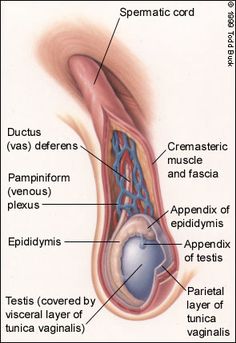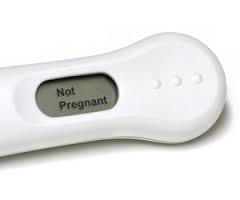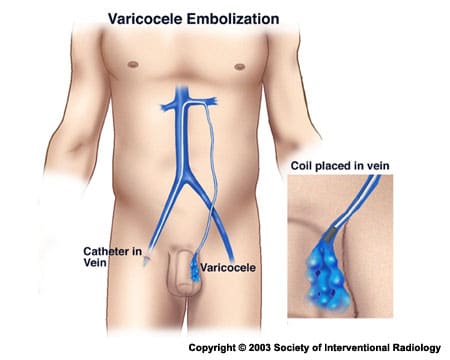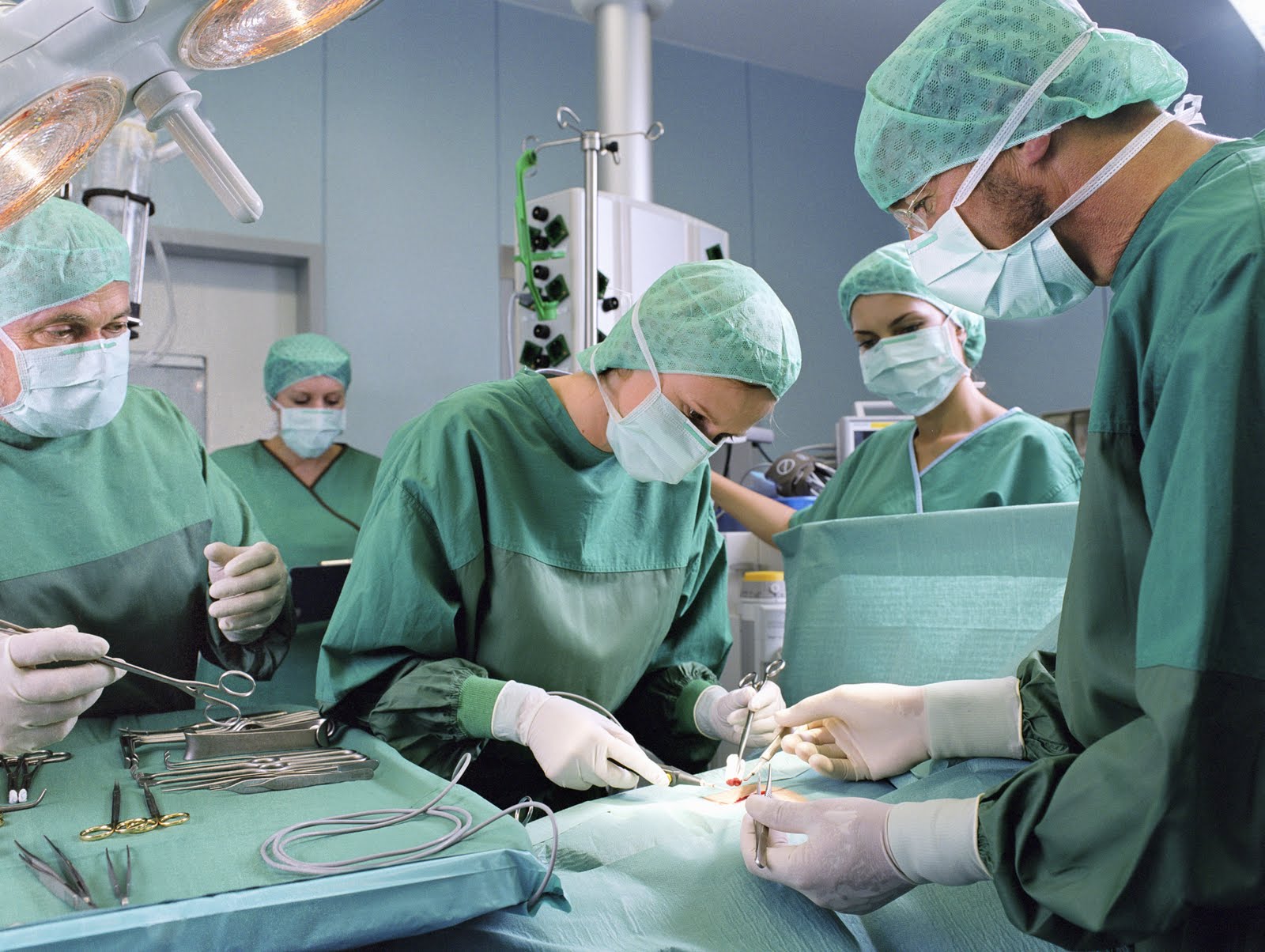What is a Varicocele?
Men who experience pain in their testicles—particularly when exercising, standing or sitting for a long period of time—may be suffering from varicoceles. Typically, painful varicoceles are prominent in size. If left untreated, varicoceles may lead to infertility.
 A varicocele is a varicose vein of the testicle and scrotum that may cause pain and lead to testicular atrophy (shrinkage of the testicles). In healthy veins within the scrotum, one-way valves allow blood to flow from the testicles and scrotum back to the heart. In a varicocele, these valves do not function properly, causing blood to pool enlarging the vein. The heat from the pooling blood raises the temperature of the scrotum causing a severe decrease in sperm count and sperm motility and increase in the number of deformed sperm. The incidence of varicoceles can be up to 30 percent in couples who are having difficulty in conceiving.
A varicocele is a varicose vein of the testicle and scrotum that may cause pain and lead to testicular atrophy (shrinkage of the testicles). In healthy veins within the scrotum, one-way valves allow blood to flow from the testicles and scrotum back to the heart. In a varicocele, these valves do not function properly, causing blood to pool enlarging the vein. The heat from the pooling blood raises the temperature of the scrotum causing a severe decrease in sperm count and sperm motility and increase in the number of deformed sperm. The incidence of varicoceles can be up to 30 percent in couples who are having difficulty in conceiving.

To better understand varicocele, it helps to understand the anatomy of the scrotum and testicles.
The scrotum is a sac of skin that contains two testicles, which produce sperm. Next to each testicle lie the epididymis, vas deferens, and spermatic cord. The scrotum also contains blood vessels and fat.
Each testicle receives its blood supply from blood vessels that pass through the spermatic cord. A blocked spermatic cord cuts off the blood supply to the testicle.
The epididymis is a thin, folded, tube that is about 15 feet long. The epididymis receives sperm from the testicle in the scrotum. The sperm mature as they pass through the epididymis. The epididymis ends in the vas deferens, through which sperm pass to the prostate gland.
Causes
A spermatic cord holds up each testicle. The cords also contain the veins, arteries, and nerves that support these glands. In healthy veins inside the scrotum, one-way valves move the blood from the testicles to the scrotum, and then they send it back to the heart. Sometimes the blood doesn’t move through the veins like it should and begins to pool in the vein, causing it to enlarge.
There are no established risk factors for developing a varicocele, and the exact cause is unclear.
A varicocele develops slowly over time. Most males are diagnosed between the ages of 15 and 25.
You may have no symptoms associated with a varicocele. However, you might experience:
Pain
Men who experience pain in their testicles—particularly when exercising, standing or sitting for a long period of time—may be suffering from varicoceles. Typically, painful varicoceles are prominent in size and can be palpated. If left untreated, varicoceles may lead to infertility.
 Fertility Problems
Fertility Problems
There is an association between varicoceles and infertility. Decreased sperm count, decreased motility of sperm and an increase in the number of deformed sperm are related to varicoceles. The enlarged veins around the testes cause infertility by raising the temperature in the scrotum and decreasing sperm production.
Testicular atrophy
The shrinking of the testicles is another sign of varicoceles. Often, once the varicocele is repaired, the testicle will return to normal size.
Treatment
It’s not always necessary to treat a varicocele. However, you may want to consider treatment if:
- your varicocele causes pain
- your varicocele causes testicular atrophy
- your varicocele causes infertility
- you’re thinking about assisted reproductive techniques
This condition can cause problems with testicular functioning in some people. The earlier you start treatment, the better your chances of improving sperm production.
Wearing tight underwear or a jock strap can sometimes provide you with support that alleviates pain or discomfort. Additional treatment such as varicocelectomy and varicocele embolization might be necessary if your symptoms get worse.
Varicocele Embolization
Varicocele embolization or catheter-directed embolization is a viable option to surgical ligation.Varicocele embolization (also called catheter-directed embolization) is a nonsurgical treatment that is a highly effective, minimally invasive technique to treat symptomatic varicoceles. Blood flow to the dysfunctional veins that cause varicoceles is shut off resulting in relief of pain and potentially correcting male infertility.
One of our Precision VIR specialists makes a tiny nick in the skin at the groin using local anesthesia, through which a thin catheter is passed into the femoral vein and ultimately directly to the testicular/gonadal vein. Contrast dye is then injected to provide direct visualization of the veins and confirm the diagnosis of varicocele. Coils and/or sclerosants (medicine injected into blood vessels to make them shrink), are used to block and shrink the veins, which reduces pressure on the varicocele. By embolizing the vein, blood flow is redirected through other pathways. Essentially blood flow to the incompetent vein is “shut off” internally, accomplishing what the urologist does without surgery.

Contact Precision VIR to schedule an appointment for Varicocele consultation. Our top vascular specialists at Precision VIR will take the time to answer your questions about our safe, effective, minimally-invasive procedures. Call us at 214-382-3200 or complete the form below.
Surgical Ligation

One of the most common treatments is open surgical ligation. In this procedure, which is typically performed by a urologist, an incision is made in the skin above the scrotum down to the testicular veins, which are tied off with sutures. Although most patients leave the hospital the same day, 24 percent of surgical ligation patients are required to stay at the hospital overnight. Patients of open surgical ligation can expect a two- to three-week recovery period.
Prevention for Varicoceles
Avoid hot temperatures
Hot temperatures will cause further dilatation of the veins and therefor will worsen the symptoms of a varicocele. So avoiding hot weather and hot baths can help to relieve symptoms and possibly prevent further pain.

Healthy Lifestyle
General methods to improve fertility would include healthy lifestyle and healthy eating. A varicocelectomy or embolization may be necessary if there is already decreased sperm count and atrophy of the testicle.

Avoid heavy lifting
Any activity which increases intra-abdominal pressure like body-building or lifting heavy objects can worsen a varicocele because of the increased pressure. If the patient has no pain, body-building is not contra-indicated.
Failure to treat a varicocele may result in a decline in semen quality and sperm count. This may lead to infertility. A varicocele also causes the testicle to atrophy and may, over time, lead to permanent, irreversible testicular injury. Without surgery, pain and discomfort experienced with a varicocele might be permanent.
Besides for possible infertility, pain and discomfort, a varicocele is not life threatening. All scrotal masses should be investigated by a medical professional to exclude a dangerous cause or a condition needing immediate treatment.

There are no established risk factors for developing a varicocele, and the exact cause is unclear.
Complications

The condition can have an effect on fertility. Varicocele is present in 35 percent of men with primary infertility and in 75 to 80 percent of males with secondary infertility. Primary infertility is generally used to refer to a couple that hasn’t conceived a child after at least one year of trying. Secondary infertility describes couples that have conceived at least once but aren’t able to again.
Varicocele Consultation
Contact Precision VIR to schedule an appointment for Varicocele consultation. Our top vascular specialists at Precision VIR will take the time to answer your questions about our safe, effective, minimally-invasive procedures. Call us at 214-382-3200 or complete the form below.
Precision VIR serves the DFW area including Dallas, Fort Worth, Carrollton, Richardson, Garland, Mesquite, Highland Park, University Park, Park Cities, Plano, Frisco, McKinney, Arlington, Irving, Grand Prairie, Denton, Lewisville and all of North Texas.
This information is not a substitute for professional medical advice. Prior to starting any new treatment or questions regarding a medical condition, always seek the advice of your doctor or other qualified health provider.
